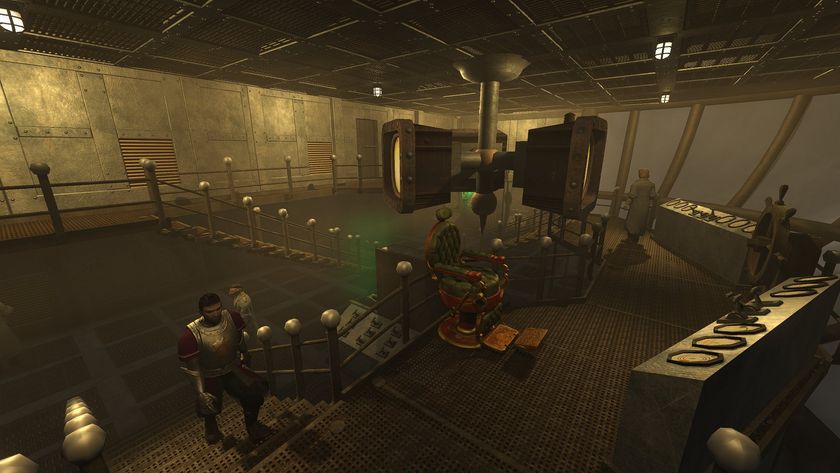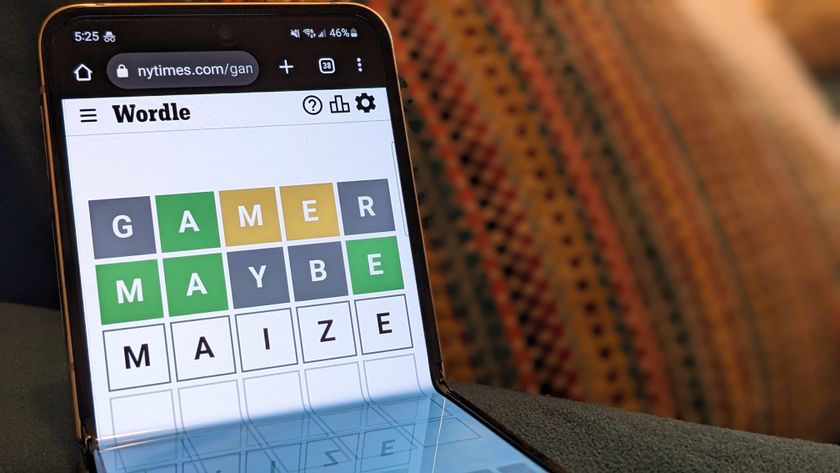SimCity tested: offline play, phantom Sims, and other controversies verified or debunked
"Dead Sims aren't accounted for"
False — This is a design shortcut, not a bug
In the process of discovering the population number padding, experimenters discovered more quirks and made more claims. This Reddit poster identifies quirks in how death is handled by experimenting in a one-house town, but misidentifies the consequences.
It is true that destroying a building can cause some of the Sims in that building to disappear. In my own one-house town, I destroyed my power plant, "killing" three Sims and leaving a household with three residents while the game still reported a population of six. The poster feared that this could be a bug which seriously affects the integrity of the simulation, but it actually rights itself naturally, suggesting it's just a design shortcut.
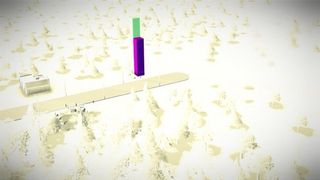
SimCity bases population reporting on the number of residences available, not the number of Sims, because residences will always be refilled throughout the course of regular play. If I do absolutely nothing, my city will go on with only three out of the potential six Sims living in my city, but then I wouldn't be playing the game. Any time new Sims come to my town, they fill vacant housing, and it happens all the time. If Sims move into a different, new house, non-full households will also be filled. Even if you don't zone any more residential, non-full households will run out of money and eventually be abandoned, which also initiates repopulation.
At higher populations, Sims come and go all the time, making the effects of killing Sims hard to identify. If you want to avoid possible complications, turn off plopped buildings before demolishing them. I have not been able to replicate the claim (made in the same Reddit post) that Sims stay in powered-off buildings for any more than a couple seconds.
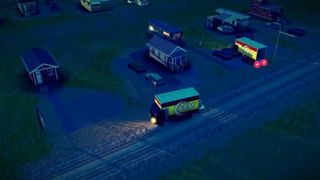
"Phantom Sims make RCI balance impossible"
False* — There is no observable effect of phantom Sims
This claim has been made in several responses to the discovery of non-simulated population: balancing residential zoning to commercial and industrial zoning is impossible because the phantom Sims are mucking it all up. I'm calling this one false with an asterisk, *because I can't prove it without seeing the game's programming. Based on my experiments, however, there is no evidence to indicate that the fictional population count has any effect on the Sims in your city.
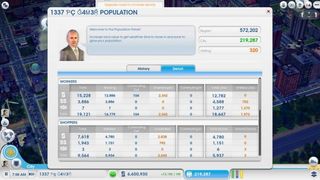
Instead, I've identified three main reasons the worker to jobs ratio is difficult to balance.
1. The "demand" bars are not informed by the workforce. Zoning more of what's in demand—usually residential and industrial, often simultaneously—is not a good way to proceed, and this is something I criticized in the review.
The biggest gaming news, reviews and hardware deals
Keep up to date with the most important stories and the best deals, as picked by the PC Gamer team.
2. Balancing land value is the real trick. Knowing that a basic, low-wealth house adds six Sims to a city, it's easy to match the number of low-wealth residents to the number of low-wealth jobs. However, because you need medium-wealth Sims, you have to build parks and services to increase land value. Land value isn't precise, making containing high, medium, and low-wealth neighborhoods a challenge.
3. Density increases must be carefully managed. If you start off zoning high density roads everywhere, you're going to have a problem. Building density must be increased carefully so you don't end up with a bunch of apartment buildings feeding excess workers to small shops and factories.
"Modding is allowed"
Maybe — The creative director has condoned it
I've criticized the always-online requirement for effectively preventing modding, but I may have spoken too soon. It's shocking that, despite the danger to public regions and the potential for exploits to affect the leaderboards, players aren't prevented from logging in with modified package files.
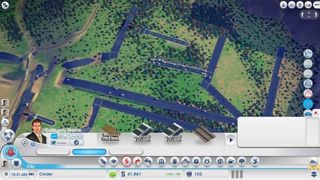
The first success of the SimCity modding community is DebugEnable.package, a file (may violate EA's TOS—use at your own risk) which enables debug mode, allowing players to draw regional highways. It seems that, even in public regions, these permanent debug changes are saved to the server. That can't be allowed, right? It probably isn't, but Creative Director Ocean Quigley did condone modding in a tweet last month:
That doesn't mean you should assume it's no risk. Modding SimCity may still violate EA's TOS, and pointing to Quigley's permission probably won't help. He did say the game is "built to be moddable," so there's a chance it'll be officially supported in the future.
"SimCity is broken"
False* — It's an experience, not an appliance
*Of course, I acknowledge that this is an opinion, but I have question to ask, and it might sting a bit. I'm having a lot of fun dissecting SimCity. I'm disappointed when Sims don't behave logically, but I take it as a challenge, and when my 200k pop city is flooded by a sudden deluge of traffic from the region, I spend hours trying to fix it. I want to know how it all works, why it works that way, and how I can exploit it.
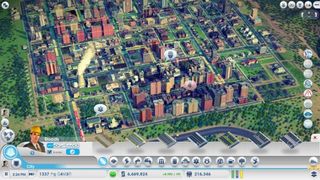
I'm glad we're talking about it, but it's not what every SimCity player is talking about. I know other players who just like making fun, creative city designs. They don't care to dig into the simulation's gears and spin them around to see what they do, or whether or not they can achieve perfect stability while maximizing density. That kind of player probably doesn't notice or isn't bothered by many of these issues, except the always-online problem. So my question is: was SimCity made for us?
I don't think it was designed to be min-maxed or intentionally tested for flaws with contrived gameplay scenarios. I'm having fun doing all that anyway, but I wonder if we're missing the experience it was designed for by spending our time trying to break it. The part of it that's a game.
I've concluded that it's not broken—not wholly, at least. If it were wholly broken, I don't think I could have had the number of positive experiences I've had with it, and it's not an appliance that's supposed to function in one specific way. It's a game—an experience generator—and a lot of those experiences are good. Sometimes players play in totally unpredictable ways, and games can't always support every approach. SimCity supports a more diverse set of experience-seekers than many other games, and in that, I think it succeeded.

Tyler grew up in Silicon Valley during the '80s and '90s, playing games like Zork and Arkanoid on early PCs. He was later captivated by Myst, SimCity, Civilization, Command & Conquer, all the shooters they call "boomer shooters" now, and PS1 classic Bushido Blade (that's right: he had Bleem!). Tyler joined PC Gamer in 2011, and today he's focused on the site's news coverage. His hobbies include amateur boxing and adding to his 1,200-plus hours in Rocket League.








